Impact of Banking Royal Commission: Accounting Theory Research Report
VerifiedAdded on 2022/09/28
|10
|1879
|21
Report
AI Summary
This report examines the impact of the Banking Royal Commission on accountants, particularly those involved in financial planning and mortgage broking. The report begins by outlining the purpose, audience, key decisions, and required information for the analysis. It then presents a literature review of relevant sources, including academic articles and government reports, to provide context and support arguments. The analysis delves into fiduciary duty, conflicts of interest, culture, leadership, accountability, and risk management within the financial services industry. The report assesses the direct and indirect impacts of the Royal Commission on accounting firms, offering recommendations for actions these firms can take in response to the changes. The report concludes with a summary of key findings and recommendations for accountants and accounting firms navigating the evolving regulatory landscape.
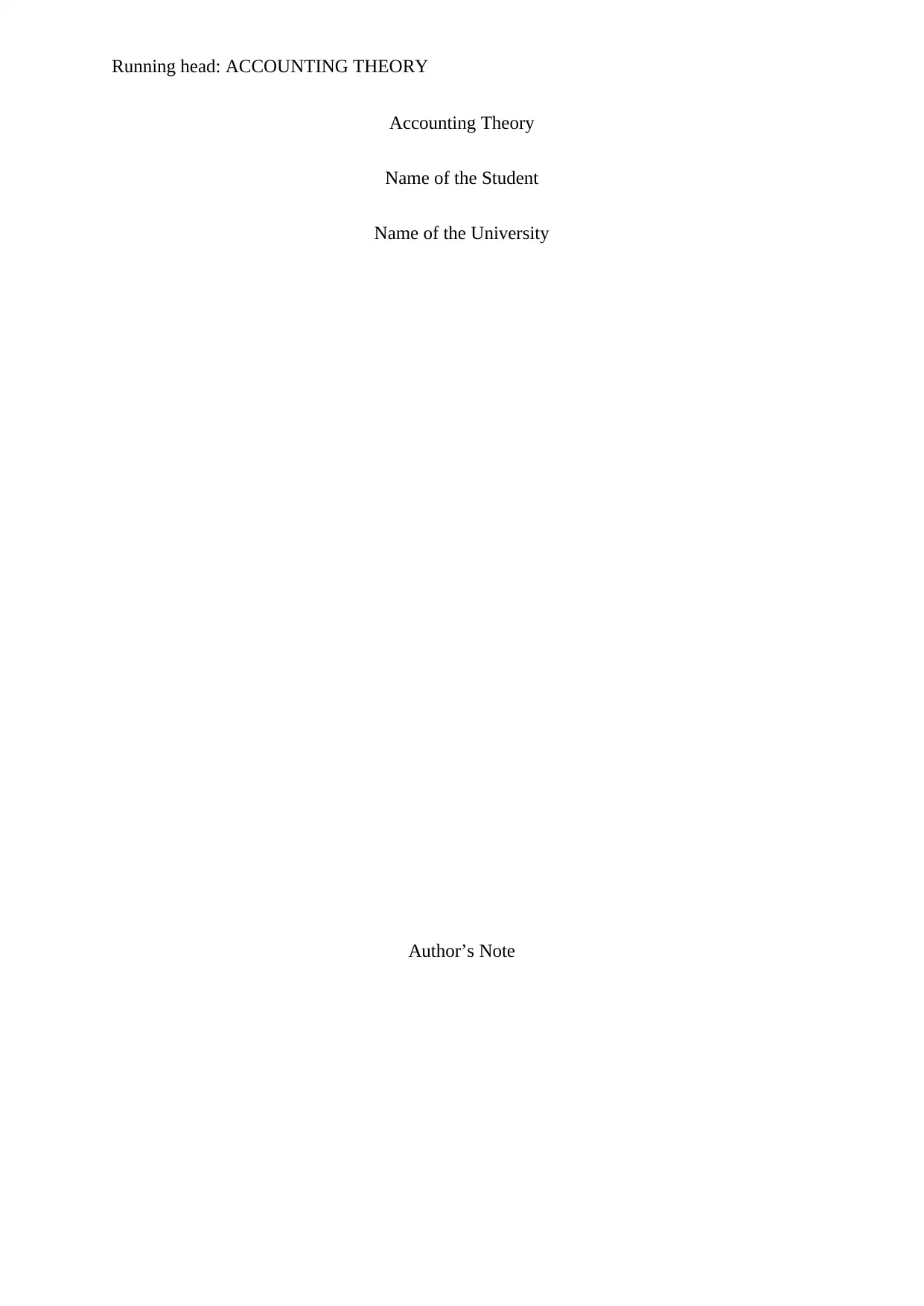
Running head: ACCOUNTING THEORY
Accounting Theory
Name of the Student
Name of the University
Author’s Note
Accounting Theory
Name of the Student
Name of the University
Author’s Note
Paraphrase This Document
Need a fresh take? Get an instant paraphrase of this document with our AI Paraphraser
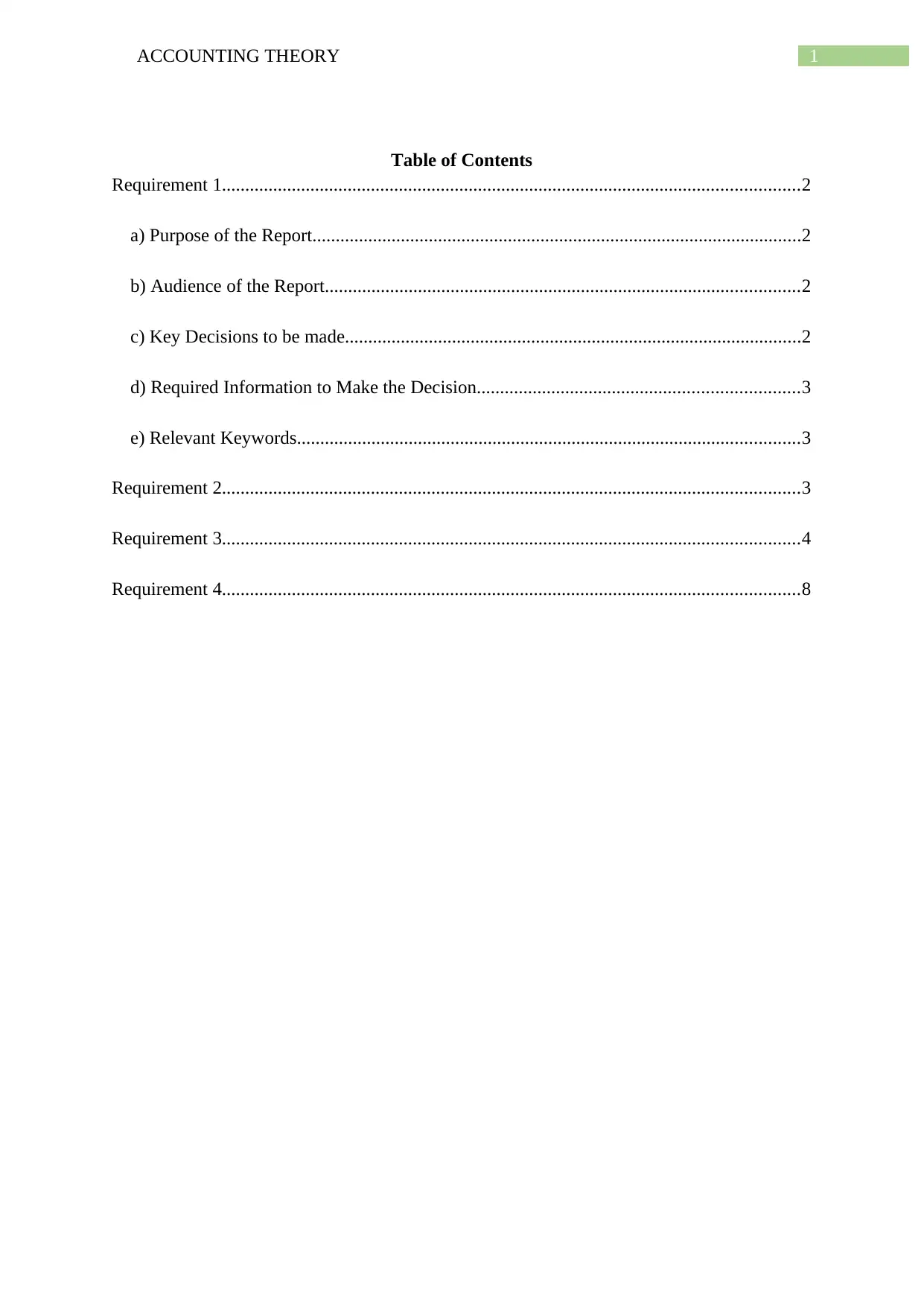
1ACCOUNTING THEORY
Table of Contents
Requirement 1............................................................................................................................2
a) Purpose of the Report.........................................................................................................2
b) Audience of the Report......................................................................................................2
c) Key Decisions to be made..................................................................................................2
d) Required Information to Make the Decision.....................................................................3
e) Relevant Keywords............................................................................................................3
Requirement 2............................................................................................................................3
Requirement 3............................................................................................................................4
Requirement 4............................................................................................................................8
Table of Contents
Requirement 1............................................................................................................................2
a) Purpose of the Report.........................................................................................................2
b) Audience of the Report......................................................................................................2
c) Key Decisions to be made..................................................................................................2
d) Required Information to Make the Decision.....................................................................3
e) Relevant Keywords............................................................................................................3
Requirement 2............................................................................................................................3
Requirement 3............................................................................................................................4
Requirement 4............................................................................................................................8
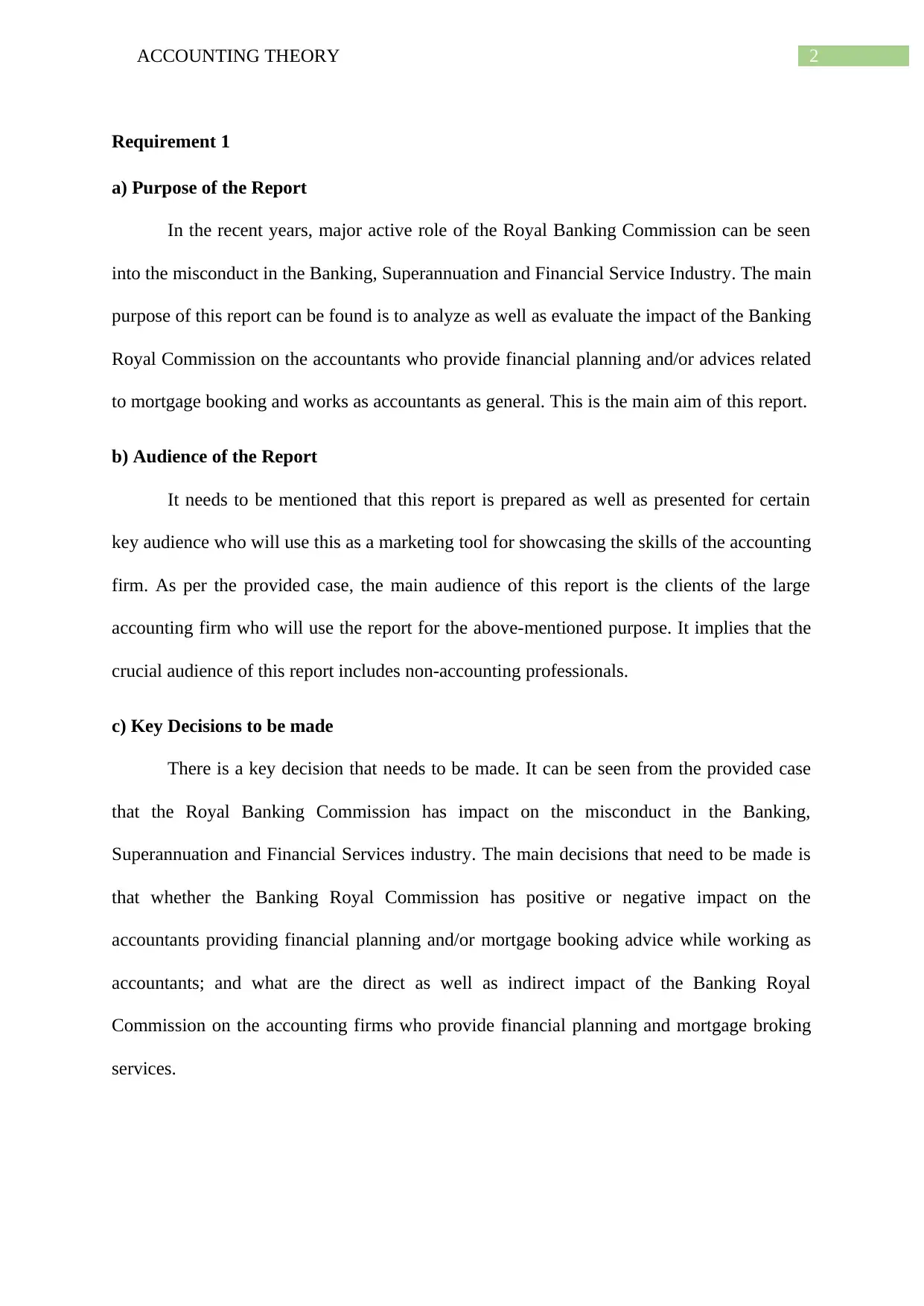
2ACCOUNTING THEORY
Requirement 1
a) Purpose of the Report
In the recent years, major active role of the Royal Banking Commission can be seen
into the misconduct in the Banking, Superannuation and Financial Service Industry. The main
purpose of this report can be found is to analyze as well as evaluate the impact of the Banking
Royal Commission on the accountants who provide financial planning and/or advices related
to mortgage booking and works as accountants as general. This is the main aim of this report.
b) Audience of the Report
It needs to be mentioned that this report is prepared as well as presented for certain
key audience who will use this as a marketing tool for showcasing the skills of the accounting
firm. As per the provided case, the main audience of this report is the clients of the large
accounting firm who will use the report for the above-mentioned purpose. It implies that the
crucial audience of this report includes non-accounting professionals.
c) Key Decisions to be made
There is a key decision that needs to be made. It can be seen from the provided case
that the Royal Banking Commission has impact on the misconduct in the Banking,
Superannuation and Financial Services industry. The main decisions that need to be made is
that whether the Banking Royal Commission has positive or negative impact on the
accountants providing financial planning and/or mortgage booking advice while working as
accountants; and what are the direct as well as indirect impact of the Banking Royal
Commission on the accounting firms who provide financial planning and mortgage broking
services.
Requirement 1
a) Purpose of the Report
In the recent years, major active role of the Royal Banking Commission can be seen
into the misconduct in the Banking, Superannuation and Financial Service Industry. The main
purpose of this report can be found is to analyze as well as evaluate the impact of the Banking
Royal Commission on the accountants who provide financial planning and/or advices related
to mortgage booking and works as accountants as general. This is the main aim of this report.
b) Audience of the Report
It needs to be mentioned that this report is prepared as well as presented for certain
key audience who will use this as a marketing tool for showcasing the skills of the accounting
firm. As per the provided case, the main audience of this report is the clients of the large
accounting firm who will use the report for the above-mentioned purpose. It implies that the
crucial audience of this report includes non-accounting professionals.
c) Key Decisions to be made
There is a key decision that needs to be made. It can be seen from the provided case
that the Royal Banking Commission has impact on the misconduct in the Banking,
Superannuation and Financial Services industry. The main decisions that need to be made is
that whether the Banking Royal Commission has positive or negative impact on the
accountants providing financial planning and/or mortgage booking advice while working as
accountants; and what are the direct as well as indirect impact of the Banking Royal
Commission on the accounting firms who provide financial planning and mortgage broking
services.
⊘ This is a preview!⊘
Do you want full access?
Subscribe today to unlock all pages.

Trusted by 1+ million students worldwide
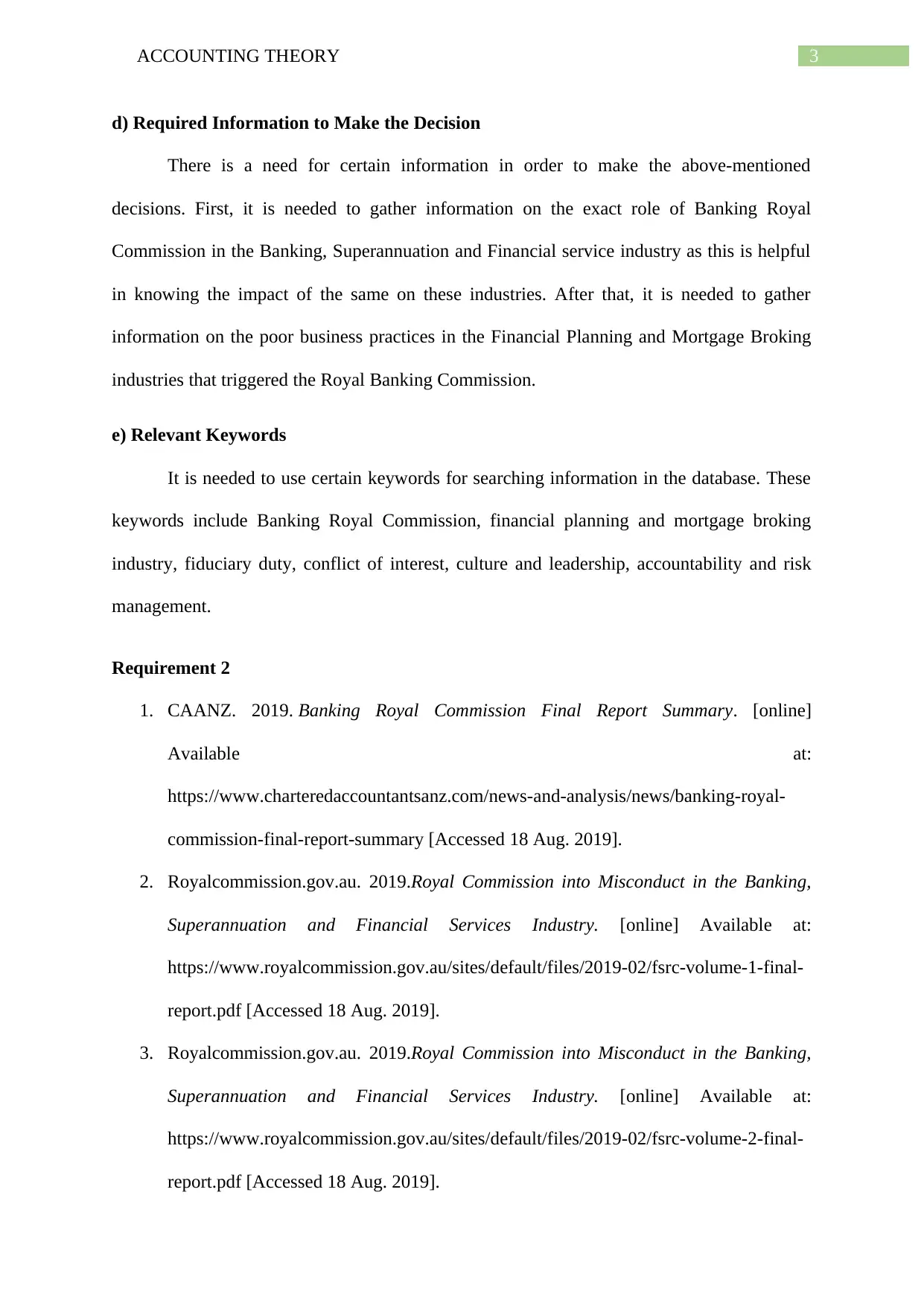
3ACCOUNTING THEORY
d) Required Information to Make the Decision
There is a need for certain information in order to make the above-mentioned
decisions. First, it is needed to gather information on the exact role of Banking Royal
Commission in the Banking, Superannuation and Financial service industry as this is helpful
in knowing the impact of the same on these industries. After that, it is needed to gather
information on the poor business practices in the Financial Planning and Mortgage Broking
industries that triggered the Royal Banking Commission.
e) Relevant Keywords
It is needed to use certain keywords for searching information in the database. These
keywords include Banking Royal Commission, financial planning and mortgage broking
industry, fiduciary duty, conflict of interest, culture and leadership, accountability and risk
management.
Requirement 2
1. CAANZ. 2019. Banking Royal Commission Final Report Summary. [online]
Available at:
https://www.charteredaccountantsanz.com/news-and-analysis/news/banking-royal-
commission-final-report-summary [Accessed 18 Aug. 2019].
2. Royalcommission.gov.au. 2019.Royal Commission into Misconduct in the Banking,
Superannuation and Financial Services Industry. [online] Available at:
https://www.royalcommission.gov.au/sites/default/files/2019-02/fsrc-volume-1-final-
report.pdf [Accessed 18 Aug. 2019].
3. Royalcommission.gov.au. 2019.Royal Commission into Misconduct in the Banking,
Superannuation and Financial Services Industry. [online] Available at:
https://www.royalcommission.gov.au/sites/default/files/2019-02/fsrc-volume-2-final-
report.pdf [Accessed 18 Aug. 2019].
d) Required Information to Make the Decision
There is a need for certain information in order to make the above-mentioned
decisions. First, it is needed to gather information on the exact role of Banking Royal
Commission in the Banking, Superannuation and Financial service industry as this is helpful
in knowing the impact of the same on these industries. After that, it is needed to gather
information on the poor business practices in the Financial Planning and Mortgage Broking
industries that triggered the Royal Banking Commission.
e) Relevant Keywords
It is needed to use certain keywords for searching information in the database. These
keywords include Banking Royal Commission, financial planning and mortgage broking
industry, fiduciary duty, conflict of interest, culture and leadership, accountability and risk
management.
Requirement 2
1. CAANZ. 2019. Banking Royal Commission Final Report Summary. [online]
Available at:
https://www.charteredaccountantsanz.com/news-and-analysis/news/banking-royal-
commission-final-report-summary [Accessed 18 Aug. 2019].
2. Royalcommission.gov.au. 2019.Royal Commission into Misconduct in the Banking,
Superannuation and Financial Services Industry. [online] Available at:
https://www.royalcommission.gov.au/sites/default/files/2019-02/fsrc-volume-1-final-
report.pdf [Accessed 18 Aug. 2019].
3. Royalcommission.gov.au. 2019.Royal Commission into Misconduct in the Banking,
Superannuation and Financial Services Industry. [online] Available at:
https://www.royalcommission.gov.au/sites/default/files/2019-02/fsrc-volume-2-final-
report.pdf [Accessed 18 Aug. 2019].
Paraphrase This Document
Need a fresh take? Get an instant paraphrase of this document with our AI Paraphraser
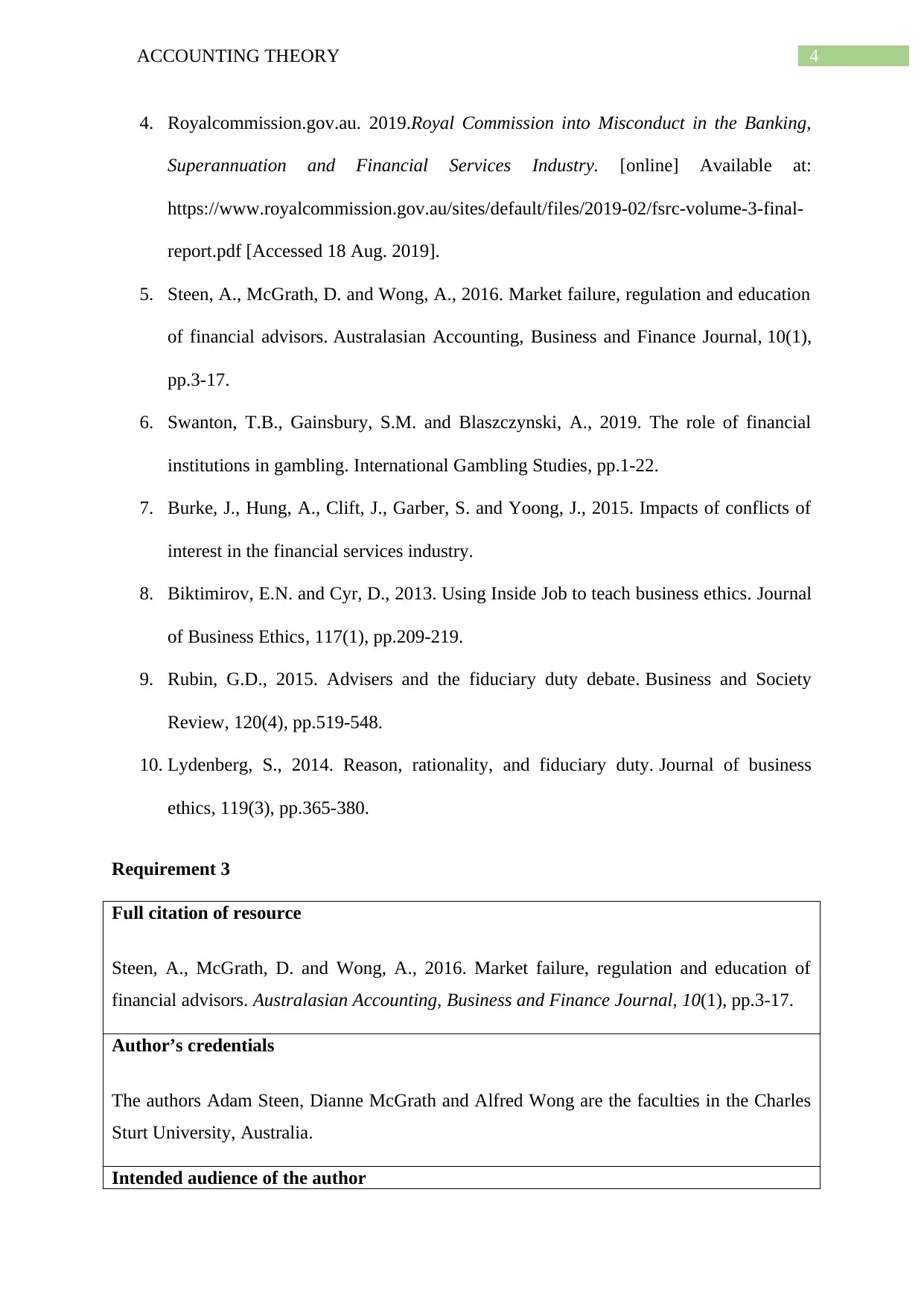
4ACCOUNTING THEORY
4. Royalcommission.gov.au. 2019.Royal Commission into Misconduct in the Banking,
Superannuation and Financial Services Industry. [online] Available at:
https://www.royalcommission.gov.au/sites/default/files/2019-02/fsrc-volume-3-final-
report.pdf [Accessed 18 Aug. 2019].
5. Steen, A., McGrath, D. and Wong, A., 2016. Market failure, regulation and education
of financial advisors. Australasian Accounting, Business and Finance Journal, 10(1),
pp.3-17.
6. Swanton, T.B., Gainsbury, S.M. and Blaszczynski, A., 2019. The role of financial
institutions in gambling. International Gambling Studies, pp.1-22.
7. Burke, J., Hung, A., Clift, J., Garber, S. and Yoong, J., 2015. Impacts of conflicts of
interest in the financial services industry.
8. Biktimirov, E.N. and Cyr, D., 2013. Using Inside Job to teach business ethics. Journal
of Business Ethics, 117(1), pp.209-219.
9. Rubin, G.D., 2015. Advisers and the fiduciary duty debate. Business and Society
Review, 120(4), pp.519-548.
10. Lydenberg, S., 2014. Reason, rationality, and fiduciary duty. Journal of business
ethics, 119(3), pp.365-380.
Requirement 3
Full citation of resource
Steen, A., McGrath, D. and Wong, A., 2016. Market failure, regulation and education of
financial advisors. Australasian Accounting, Business and Finance Journal, 10(1), pp.3-17.
Author’s credentials
The authors Adam Steen, Dianne McGrath and Alfred Wong are the faculties in the Charles
Sturt University, Australia.
Intended audience of the author
4. Royalcommission.gov.au. 2019.Royal Commission into Misconduct in the Banking,
Superannuation and Financial Services Industry. [online] Available at:
https://www.royalcommission.gov.au/sites/default/files/2019-02/fsrc-volume-3-final-
report.pdf [Accessed 18 Aug. 2019].
5. Steen, A., McGrath, D. and Wong, A., 2016. Market failure, regulation and education
of financial advisors. Australasian Accounting, Business and Finance Journal, 10(1),
pp.3-17.
6. Swanton, T.B., Gainsbury, S.M. and Blaszczynski, A., 2019. The role of financial
institutions in gambling. International Gambling Studies, pp.1-22.
7. Burke, J., Hung, A., Clift, J., Garber, S. and Yoong, J., 2015. Impacts of conflicts of
interest in the financial services industry.
8. Biktimirov, E.N. and Cyr, D., 2013. Using Inside Job to teach business ethics. Journal
of Business Ethics, 117(1), pp.209-219.
9. Rubin, G.D., 2015. Advisers and the fiduciary duty debate. Business and Society
Review, 120(4), pp.519-548.
10. Lydenberg, S., 2014. Reason, rationality, and fiduciary duty. Journal of business
ethics, 119(3), pp.365-380.
Requirement 3
Full citation of resource
Steen, A., McGrath, D. and Wong, A., 2016. Market failure, regulation and education of
financial advisors. Australasian Accounting, Business and Finance Journal, 10(1), pp.3-17.
Author’s credentials
The authors Adam Steen, Dianne McGrath and Alfred Wong are the faculties in the Charles
Sturt University, Australia.
Intended audience of the author
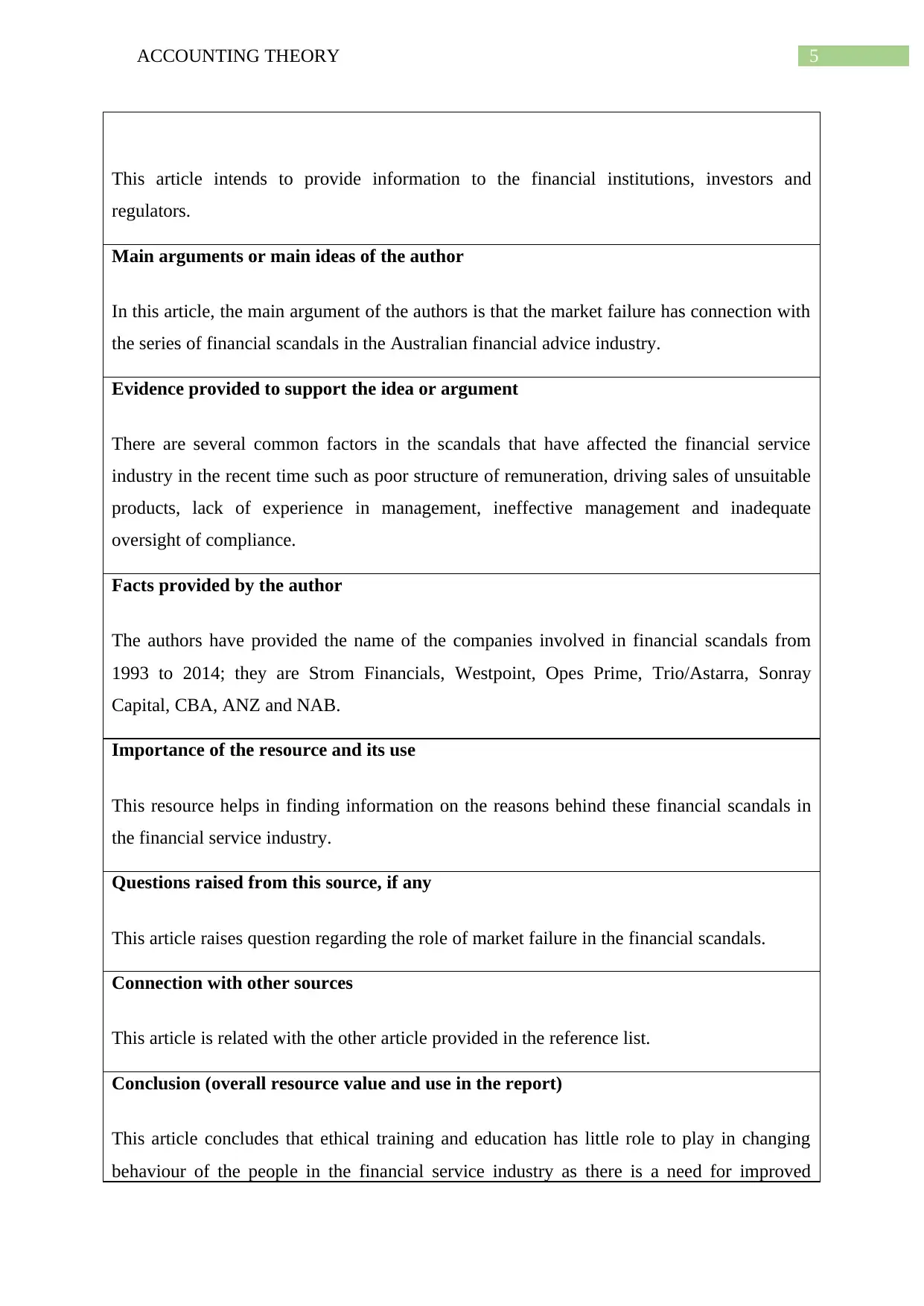
5ACCOUNTING THEORY
This article intends to provide information to the financial institutions, investors and
regulators.
Main arguments or main ideas of the author
In this article, the main argument of the authors is that the market failure has connection with
the series of financial scandals in the Australian financial advice industry.
Evidence provided to support the idea or argument
There are several common factors in the scandals that have affected the financial service
industry in the recent time such as poor structure of remuneration, driving sales of unsuitable
products, lack of experience in management, ineffective management and inadequate
oversight of compliance.
Facts provided by the author
The authors have provided the name of the companies involved in financial scandals from
1993 to 2014; they are Strom Financials, Westpoint, Opes Prime, Trio/Astarra, Sonray
Capital, CBA, ANZ and NAB.
Importance of the resource and its use
This resource helps in finding information on the reasons behind these financial scandals in
the financial service industry.
Questions raised from this source, if any
This article raises question regarding the role of market failure in the financial scandals.
Connection with other sources
This article is related with the other article provided in the reference list.
Conclusion (overall resource value and use in the report)
This article concludes that ethical training and education has little role to play in changing
behaviour of the people in the financial service industry as there is a need for improved
This article intends to provide information to the financial institutions, investors and
regulators.
Main arguments or main ideas of the author
In this article, the main argument of the authors is that the market failure has connection with
the series of financial scandals in the Australian financial advice industry.
Evidence provided to support the idea or argument
There are several common factors in the scandals that have affected the financial service
industry in the recent time such as poor structure of remuneration, driving sales of unsuitable
products, lack of experience in management, ineffective management and inadequate
oversight of compliance.
Facts provided by the author
The authors have provided the name of the companies involved in financial scandals from
1993 to 2014; they are Strom Financials, Westpoint, Opes Prime, Trio/Astarra, Sonray
Capital, CBA, ANZ and NAB.
Importance of the resource and its use
This resource helps in finding information on the reasons behind these financial scandals in
the financial service industry.
Questions raised from this source, if any
This article raises question regarding the role of market failure in the financial scandals.
Connection with other sources
This article is related with the other article provided in the reference list.
Conclusion (overall resource value and use in the report)
This article concludes that ethical training and education has little role to play in changing
behaviour of the people in the financial service industry as there is a need for improved
⊘ This is a preview!⊘
Do you want full access?
Subscribe today to unlock all pages.

Trusted by 1+ million students worldwide
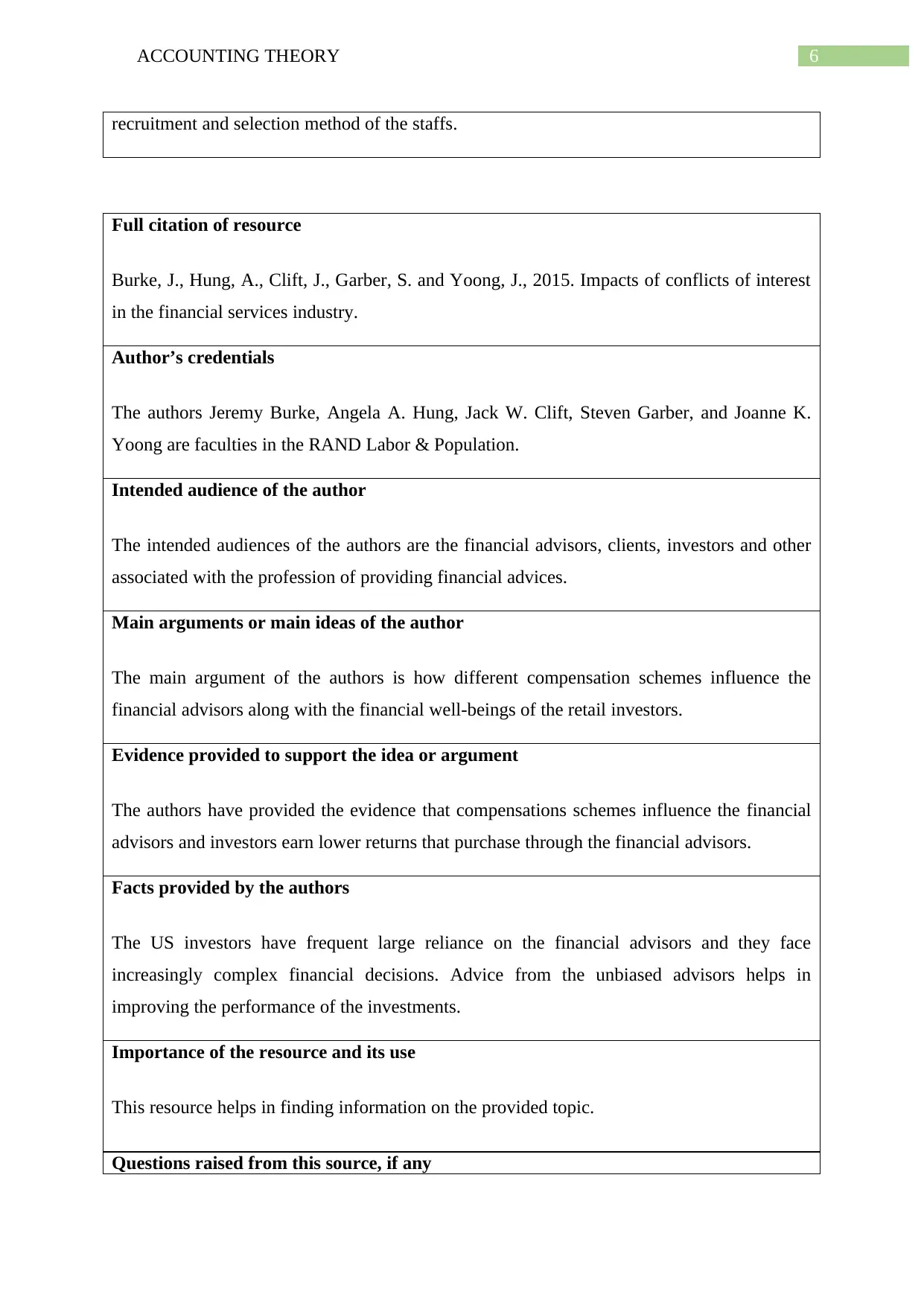
6ACCOUNTING THEORY
recruitment and selection method of the staffs.
Full citation of resource
Burke, J., Hung, A., Clift, J., Garber, S. and Yoong, J., 2015. Impacts of conflicts of interest
in the financial services industry.
Author’s credentials
The authors Jeremy Burke, Angela A. Hung, Jack W. Clift, Steven Garber, and Joanne K.
Yoong are faculties in the RAND Labor & Population.
Intended audience of the author
The intended audiences of the authors are the financial advisors, clients, investors and other
associated with the profession of providing financial advices.
Main arguments or main ideas of the author
The main argument of the authors is how different compensation schemes influence the
financial advisors along with the financial well-beings of the retail investors.
Evidence provided to support the idea or argument
The authors have provided the evidence that compensations schemes influence the financial
advisors and investors earn lower returns that purchase through the financial advisors.
Facts provided by the authors
The US investors have frequent large reliance on the financial advisors and they face
increasingly complex financial decisions. Advice from the unbiased advisors helps in
improving the performance of the investments.
Importance of the resource and its use
This resource helps in finding information on the provided topic.
Questions raised from this source, if any
recruitment and selection method of the staffs.
Full citation of resource
Burke, J., Hung, A., Clift, J., Garber, S. and Yoong, J., 2015. Impacts of conflicts of interest
in the financial services industry.
Author’s credentials
The authors Jeremy Burke, Angela A. Hung, Jack W. Clift, Steven Garber, and Joanne K.
Yoong are faculties in the RAND Labor & Population.
Intended audience of the author
The intended audiences of the authors are the financial advisors, clients, investors and other
associated with the profession of providing financial advices.
Main arguments or main ideas of the author
The main argument of the authors is how different compensation schemes influence the
financial advisors along with the financial well-beings of the retail investors.
Evidence provided to support the idea or argument
The authors have provided the evidence that compensations schemes influence the financial
advisors and investors earn lower returns that purchase through the financial advisors.
Facts provided by the authors
The US investors have frequent large reliance on the financial advisors and they face
increasingly complex financial decisions. Advice from the unbiased advisors helps in
improving the performance of the investments.
Importance of the resource and its use
This resource helps in finding information on the provided topic.
Questions raised from this source, if any
Paraphrase This Document
Need a fresh take? Get an instant paraphrase of this document with our AI Paraphraser
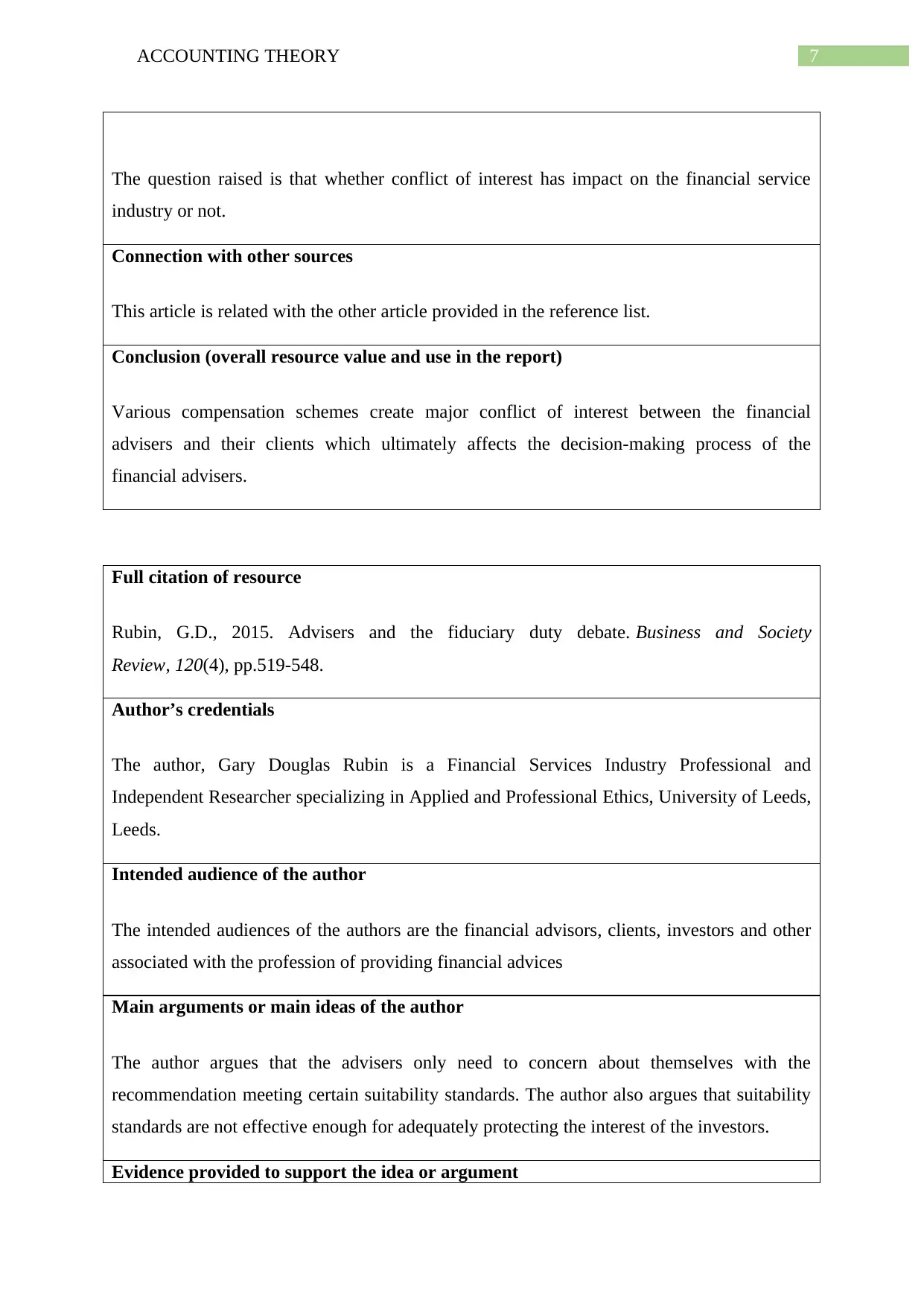
7ACCOUNTING THEORY
The question raised is that whether conflict of interest has impact on the financial service
industry or not.
Connection with other sources
This article is related with the other article provided in the reference list.
Conclusion (overall resource value and use in the report)
Various compensation schemes create major conflict of interest between the financial
advisers and their clients which ultimately affects the decision-making process of the
financial advisers.
Full citation of resource
Rubin, G.D., 2015. Advisers and the fiduciary duty debate. Business and Society
Review, 120(4), pp.519-548.
Author’s credentials
The author, Gary Douglas Rubin is a Financial Services Industry Professional and
Independent Researcher specializing in Applied and Professional Ethics, University of Leeds,
Leeds.
Intended audience of the author
The intended audiences of the authors are the financial advisors, clients, investors and other
associated with the profession of providing financial advices
Main arguments or main ideas of the author
The author argues that the advisers only need to concern about themselves with the
recommendation meeting certain suitability standards. The author also argues that suitability
standards are not effective enough for adequately protecting the interest of the investors.
Evidence provided to support the idea or argument
The question raised is that whether conflict of interest has impact on the financial service
industry or not.
Connection with other sources
This article is related with the other article provided in the reference list.
Conclusion (overall resource value and use in the report)
Various compensation schemes create major conflict of interest between the financial
advisers and their clients which ultimately affects the decision-making process of the
financial advisers.
Full citation of resource
Rubin, G.D., 2015. Advisers and the fiduciary duty debate. Business and Society
Review, 120(4), pp.519-548.
Author’s credentials
The author, Gary Douglas Rubin is a Financial Services Industry Professional and
Independent Researcher specializing in Applied and Professional Ethics, University of Leeds,
Leeds.
Intended audience of the author
The intended audiences of the authors are the financial advisors, clients, investors and other
associated with the profession of providing financial advices
Main arguments or main ideas of the author
The author argues that the advisers only need to concern about themselves with the
recommendation meeting certain suitability standards. The author also argues that suitability
standards are not effective enough for adequately protecting the interest of the investors.
Evidence provided to support the idea or argument
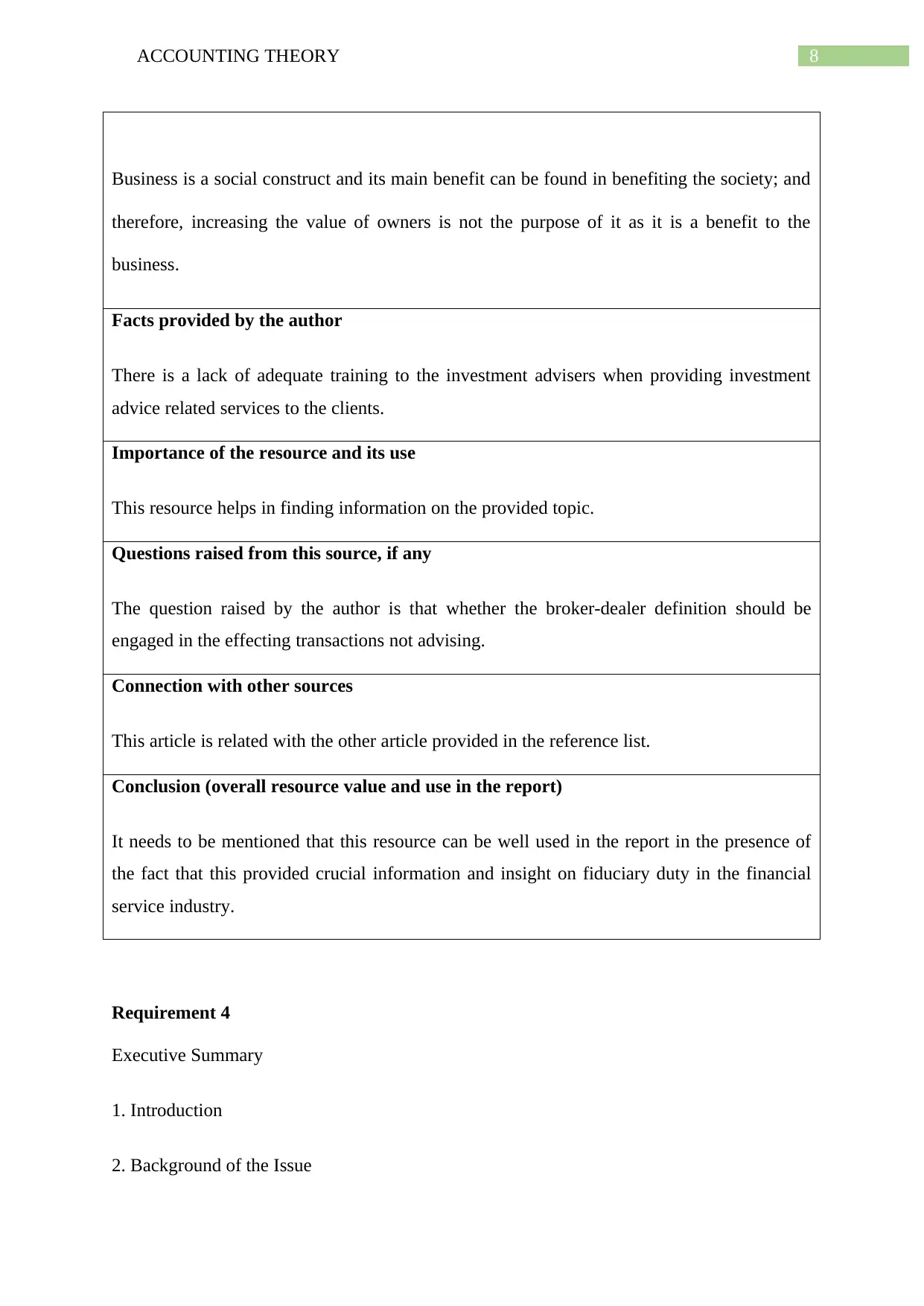
8ACCOUNTING THEORY
Business is a social construct and its main benefit can be found in benefiting the society; and
therefore, increasing the value of owners is not the purpose of it as it is a benefit to the
business.
Facts provided by the author
There is a lack of adequate training to the investment advisers when providing investment
advice related services to the clients.
Importance of the resource and its use
This resource helps in finding information on the provided topic.
Questions raised from this source, if any
The question raised by the author is that whether the broker-dealer definition should be
engaged in the effecting transactions not advising.
Connection with other sources
This article is related with the other article provided in the reference list.
Conclusion (overall resource value and use in the report)
It needs to be mentioned that this resource can be well used in the report in the presence of
the fact that this provided crucial information and insight on fiduciary duty in the financial
service industry.
Requirement 4
Executive Summary
1. Introduction
2. Background of the Issue
Business is a social construct and its main benefit can be found in benefiting the society; and
therefore, increasing the value of owners is not the purpose of it as it is a benefit to the
business.
Facts provided by the author
There is a lack of adequate training to the investment advisers when providing investment
advice related services to the clients.
Importance of the resource and its use
This resource helps in finding information on the provided topic.
Questions raised from this source, if any
The question raised by the author is that whether the broker-dealer definition should be
engaged in the effecting transactions not advising.
Connection with other sources
This article is related with the other article provided in the reference list.
Conclusion (overall resource value and use in the report)
It needs to be mentioned that this resource can be well used in the report in the presence of
the fact that this provided crucial information and insight on fiduciary duty in the financial
service industry.
Requirement 4
Executive Summary
1. Introduction
2. Background of the Issue
⊘ This is a preview!⊘
Do you want full access?
Subscribe today to unlock all pages.

Trusted by 1+ million students worldwide
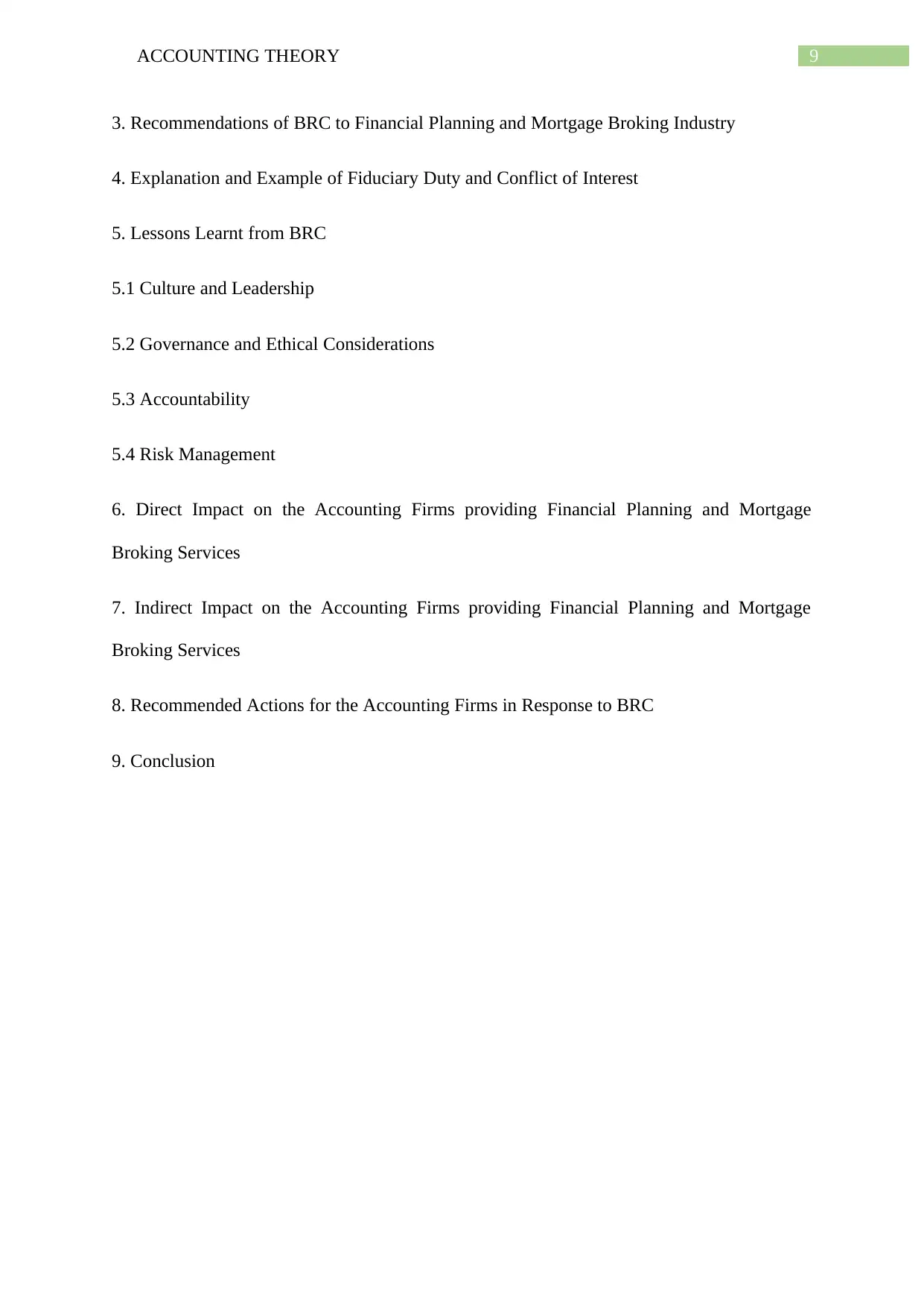
9ACCOUNTING THEORY
3. Recommendations of BRC to Financial Planning and Mortgage Broking Industry
4. Explanation and Example of Fiduciary Duty and Conflict of Interest
5. Lessons Learnt from BRC
5.1 Culture and Leadership
5.2 Governance and Ethical Considerations
5.3 Accountability
5.4 Risk Management
6. Direct Impact on the Accounting Firms providing Financial Planning and Mortgage
Broking Services
7. Indirect Impact on the Accounting Firms providing Financial Planning and Mortgage
Broking Services
8. Recommended Actions for the Accounting Firms in Response to BRC
9. Conclusion
3. Recommendations of BRC to Financial Planning and Mortgage Broking Industry
4. Explanation and Example of Fiduciary Duty and Conflict of Interest
5. Lessons Learnt from BRC
5.1 Culture and Leadership
5.2 Governance and Ethical Considerations
5.3 Accountability
5.4 Risk Management
6. Direct Impact on the Accounting Firms providing Financial Planning and Mortgage
Broking Services
7. Indirect Impact on the Accounting Firms providing Financial Planning and Mortgage
Broking Services
8. Recommended Actions for the Accounting Firms in Response to BRC
9. Conclusion
1 out of 10
Related Documents
Your All-in-One AI-Powered Toolkit for Academic Success.
+13062052269
info@desklib.com
Available 24*7 on WhatsApp / Email
![[object Object]](/_next/static/media/star-bottom.7253800d.svg)
Unlock your academic potential
Copyright © 2020–2026 A2Z Services. All Rights Reserved. Developed and managed by ZUCOL.




